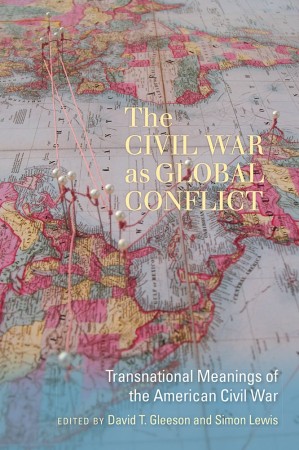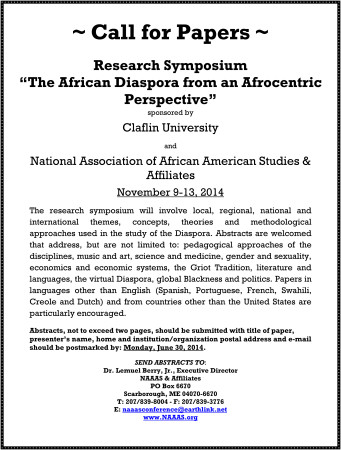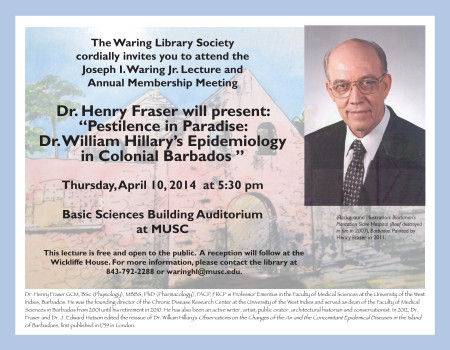For all the Carolina Lowcountry and Atlantic World people in the Northeast US, the Gilder Lehrman Center will hold its 16th Annual International Conference at the Yale Center for British Art (1080 Chapel Street, New Haven, CT) on November 7-8, 2014. The two-day conference is meant to coincide with the Center for British Art’s exhibition Figures of Empire: Slavery and Portraiture in Eighteenth-Century Atlantic Britain, and conference will help place these pieces in historical contexts and explore the relationship between slavery and British art and culture. For those in the area (and those elsewhere) who are interested, here is the link to the conference homepage: http://www.yale.edu/glc/visualizing-slavery/index.htm.
Category Archives: CLAW News
Hines Prize-Winner Coming to the College of Charleston!
Family Histories Film Series Concludes with Presentation of “All My Babies”
On September 24, the Carolina Lowcountry and Atlantic World program concluded the Family Histories Film Series with a very well-attended screening of “All My Babies: A Midwife’s Own Story.” “All My Babies” is a training film about midwifery filmed on location in Albany, Georgia in the 1950s. Written, directed, and produced by George C. Stoney, the film features Mrs. Mary Coley, a midwife with many years of experience, as well as public health doctors and nurses. The film was chosen by the Library of Congress in 2002 to be placed on the National Film Registry. “All My Babies” is seminal in that it not only presents a portrait of Miss Mary and her work as a midwife, but it also provides a view into the lives of African-Americans in the rural South in the 50s. The film was introduced by Dr. Cara Delay and Dr. Sandra Slater, professors in the History Department at the College of Charleston, who also concluded the event with a Q & A. Delay specializes in the gender and women’s history in Modern Britain and Ireland, and she is conducting research on the reproduction and motherhood in twentieth-century Ireland. Slater is also interested in gender, sexual, and women’s history, particularly as those subjects pertain to seventeenth-century North America. They pointed out that the film is very much a product of 1950s America, and how that along with the careful, deliberate work of Stoney add to the significance of “All My Babies.” The great turnout at the event made it a good conclusion to the Family Histories Film Series.
Connections, 2014-2015: Relaunch of CLAW’s Newsletter
The CLAW program is pleased to announce the relaunch of CLAW’s newsletter. Connections will be published annually in late August/early September.
Click here to download: CLAW newsletter 2014-15
The Lowcountry Digital History Initiative – A New Digital Resource
The Lowcountry Digital History Initiative (LDHI) is a digital public history project hosted by the Lowcountry Digital Library (LCDL) at the College of Charleston. Funded through a pilot project grant from the Humanities Council of South Carolina and a major grant award from the Dorothy and Gaylord Donnelley Foundation, LDHI began development in 2013 and launched in 2014 as a digital consultation service, scholarly editorial resource, and online platform for partner institutions and collaborative scholars to translate multi-institutional archival materials, historic landscape features and structures, and scholarly research into digital public history exhibition projects.
In partnership with the College of Charleston’s Avery Research Center for African American History and Culture and the Carolina Lowcountry and Atlantic World program (CLAW), a major goal within LDHI’s mission is to encourage projects that highlight underrepresented race, class, gender, and labor histories within the Lowcountry region, and in historically interconnected Atlantic World sites. We believe digital interpretation can play a major role in helping to articulate the diverse histories of the Lowcountry and Atlantic World’s historic landscapes and structures. Collaborating with local archives, libraries, and museums, LDHI also strives to interpret and enhance access to regional resources by synthesizing exhibits that draw upon archival collections from multiple institutions.
LDHI now features thirteen exhibitions, with many exciting projects on the horizon. We hope to see the project grow through new digital history exhibits and increased educational outreach. Please visit the Lowcountry Digital History Initiative to view all current exhibitions. (http://ldhi.library.cofc.edu/). LDHI’s exhibits can be useful resources for your own work, including research, classroom curriculum, and public educational outreach. We encourage you to explore all of LDHI’s online exhibitions and consider the site as digital resource that will grow and change over time.
In addition, the LDHI team is excited to welcome Harry Egner, Ciera Gordon, and Rachel Morse as new LDHI Graduate Assistants from the College of Charleston-Citadel’s Joint M.A History Program.
Finally, as a new digital project, we are actively working to expand and improve LDHI. For questions about LDHI, or to learn more about how you can develop a project or collaborate with the Lowcountry Digital History Initiative, please contact LDHI Project Coordinator Amanda Noll, nolla@cofc.edu or Co-Director Dr. Mary Battle, battlemp@cofc.edu.
New CLAW Publication: The Civil War as Global Conflict: Transnational Meanings of the American Civil War
The CLAW program is pleased to announce the publication of David T. Gleeson and Simon Lewis’s new book, The Civil War as Global Conflict: Transnational Meanings of the American Civil War. This edited volume developed from CLAW’s “Civil War—Global Conflict” conference, which was held at the College of Charleston in March 2011 as part of the sesquicentennial commemoration of the Civil War. It is the twentieth publication in the Carolina Lowcountry and Atlantic World book series with the University of South Carolina Press.
The Civil War as Global Conflict attempts to expand the insular national and regional narratives that have shaped much of the popular and scholarly discussions of the history of the US Civil War. As Gary W. Gallagher, Nau Professor of History at the University of Virginia and author of The Union War says, “The essays in this welcome volume place aspects of the Civil War within a spacious world context. Taking up topics that address economics, diplomacy, ethnicity, politics, gender, race, and memory, they remind us that the greatest military event in American history reverberated far beyond the shores of the United States and the Confederacy.”
Highly distinguished Civil War scholars such as James M. McPherson and Aaron Sheehan-Dean examine the struggles over slavery and sovereignty in the United States in the context of other conflicts and political developments elsewhere in the western hemisphere. Although the Civil War was the bloodiest conflict in US history, and one of the nation’s most defining events, this volume underscores that the war was by no means the only conflict that ensnared global imperial powers in the mid-nineteenth century. In some ways the Civil War was just another element in contemporary conflicts over the definitions of liberty, democracy, and nationhood occurring throughout the world.
The volume’s twelve individual essays address numerous provocative themes covering a wide array of topics, ranging from discussions of the legality of retaliation in the war, through cultural and diplomatic history, to analyses of the significance of Florence Nightingale in Civil War and post-Civil War nursing practices. The book concludes with a coda in which noted local, national, and international historians reflect on how we remember the war—what we remember and what we forget—and the reasons why we should remember the war. While we now take for granted the nation’s values of freedom and democracy, we cannot understand the impact of the Civil War and the victorious “new birth of freedom” without considering the global influences and impacts of this event
Brian Schoen, associate professor of history and director of Undergraduate Studies at Ohio University describes the volume as “highly original in conceptualization and execution” and likely to revise our understanding of the war, the broader context within which it was fought, and especially its meaning across time and space.”
A native of Ireland, David T. Gleeson is a professor of American history at Northumbria University in Newcastle upon Tyne and a former director of the College of Charleston’s Carolina Lowcountry and Atlantic World program. He is the editor of The Irish in the Atlantic World, co-editor of Ambiguous Anniversary: The Bicentennial of the International Slave Trade Bans, and author of The Green and the Gray: The Irish in the Confederate States of America.
Simon Lewis is a professor of world literature at the College of Charleston, where he is also an associate director of the Carolina Lowcountry and Atlantic World program. Lewis is the author of White Women Writers and Their African Invention and British and African Literature in Transnational Context. He is also the co-editor of Ambiguous Anniversary: The Bicentennial of the International Slave Trade Bans.
For additional information on this book and the USC Press’s Carolina Lowcountry and Atlantic World book series, please visit http://www.sc.edu/uscpress/books/2014/7325.html.
Kokanko Sata Doumba: A Queen of Wassoulou Music Visits the American South
After her visit with Afropop, Kokanko headed south for appearances at the College of Charleston, the University of Georgia, and Furman and Duke Universities. This tour was organized by Julie Moore, the executive director of the Cradle of Jazz Project, and an adjunct professor of music at Furman. Moore has studied West African music and dance for 15 years, and in 2010 began uncovering new evidence that the Mande played a critical role in the formation of the cornerstone of black New Orleans culture during the 1700s.
Call for Papers: Research Symposium, “The African Diaspora from an Afrocentric Perspective,” sponsored by Claflin University and the National Association of African American Studies, Nov. 9-13, 2014
Upcoming MUSC Lecture: “Pestilence in Paradise: Dr. William Hillary’s Epidemiology in Colonial Barbados,” Dr. Henry Fraser, April 10, 5:30 pm, Basic Sciences Building auditorium
The Waring Historical Library at the Medical University of South Carolina (MUSC) announces that its annual Joseph I. Waring Jr. Lecture and annual membership meeting will take place on Thursday, April 10, 2014 at 5:30 pm in the Basic Sciences Building auditorium on the campus of the Medical University of South Carolina.
Dr. Henry Fraser will present his talk, “Pestilence in Paradise: Dr. William Hillary’s Epidemiology in Colonial Barbados.” In 2012, Dr. Fraser and Dr. J. Edward Hutson edited the reissue of Dr. William Hillary’s Observations on the Changes of the Air and the Concomitant Epidemical Diseases in the Island of Barbadoes, first published in 1759 in London.
Dr. Henry Fraser GCM, BSc (Physiology), MBBS, PhD (Pharmacology), FACP, FRCP is Professor Emeritus in the Faculty of Medical Sciences at the University of the West Indies, Barbados. He was the founding director of the Chronic Disease Research Center at the University of the West Indies and served as dean of the Faculty of Medical Sciences in Barbados from 2001 until his retirement in 2010. He has also been an active writer, artist, public orator, architectural historian and conservationist. His publications include more than one hundred peer-reviewed medical and scientific papers on medical education, drug treatment, epilepsy, hypertension, obesity, stroke and many other subjects. He is also the author of hundreds of articles and newspaper columns, along with several books about Barbados history, heritage, architecture, and culture, including Treasures of Barbados, Illustrious West Indians, and the co-authored Historic Houses of Barbados and A–Z of Barbados Heritage.
A reception will follow at the Wickliffe House. This event is free and open to the public.
For more information, please contact the library at 843-792-2288 or waringhl@musc.edu
Graduate Historical Society, Evening Lecture: “From Graduate School to Public History and Federal Opportunities,” Dr. John Sprinkle, Bureau Historian for the National Park Service. Wednesday, March 26, 7:00pm, location TBA.
The Graduate Historical Society, the History Department and Graduate School at the College of Charleston, and the Carolina Lowcountry and Atlantic World program will be presenting an evening lecture by Dr. John Sprinkle on Wednesday, March 26. Dr. Sprinkle is the Bureau Historian for the National Park Service and author of Crafting Preservation Criteria: The National Register of Historic Places and American Historic Preservation. He will be speaking about careers in public history, employment opportunities for historians with the federal government, and how to prepare for post-graduate school positions related to history.
The joint MA program in History at the Citadel and the College of Charleston has continually worked to provide opportunities for young historians to develop skills that translate into employment beyond graduate school. Dr. Sprinkle’s academic background as a historian, which transitioned into public history work at the federal level, provides a unique perspective for graduate history students who want to branch out from post-grad careers in teaching or Ph.D. programs. In addition, his experience with grant writing, research, and doctoral work is invaluable for those students hoping to continue their graduate education and historical research. Building off the mission of CLAW to promote scholarship on the Lowcountry, and public understanding of this region and its place in a broader international context, the GHS intends for this lecture to inform graduate students about the opportunities of public history initiatives in Charleston and the surrounding areas, while also exploring ways in which MA graduates can contribute to this research and present information to the public. With the help of the Carolina Lowcountry and Atlantic World program, we hope that this lecture will further develop our established commitment to provide opportunities for post-MA students.
The Graduate Historical Society would like to thank Dr. John White and the CLAW program for their generous support for this event, as well as Dr. Amy McCandless, the Dean of the Graduate School, and Dr. Jason Coy, program director of Master of Arts in History, without whom this event would not be possible.




